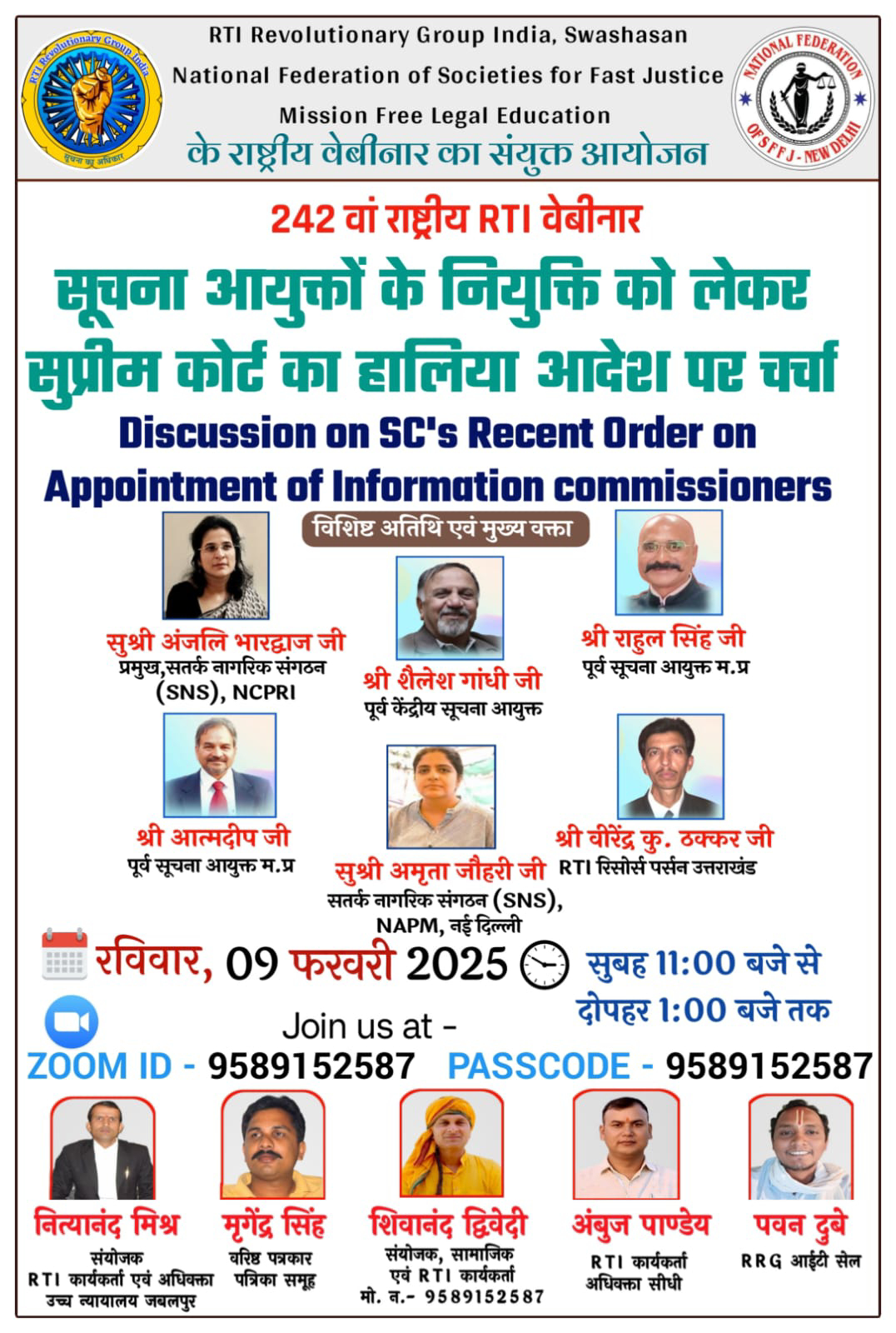*Meeting summary for Shivanand Dwivedi - 242nd RTI & Legal Webinar - Recent Orders of SC on Appointment of ICs (02/09/2025)*
*Quick recap*
The team discussed the importance of mindset change, transparency, and accountability in the functioning of the RTI system, with a focus on the role of the government in monitoring and regulating various systems. They also explored the challenges faced in implementing the Right to Information Act, including the need for a roadmap, qualified staff, and clear instructions for the appointment of information commissioners. The conversation ended with discussions on the functioning of the Information Commission, the challenges in handling RTI cases, and the importance of effective communication and timely responses to public concerns.
*Summary*
*Mindset Change, RTI Act, and Accountability*
Amrita discussed the importance of mindset change and the role of the government in monitoring and regulating various systems. She also touched on the financial implications of the RTI Act and the retirement age of 65. Amrita emphasized the need for a roadmap and a blueprint to tackle the backlog of cases. She also highlighted the importance of transparency and accountability in the functioning of the RTI system. Shivanand and Shailesh contributed to the discussion, with Shailesh suggesting the need for a detailed reasoning in certain cases. The conversation ended with a mention of a case scheduled for Tuesday in the Delhi High Court.
*Implementing RTI Act in India Challenges*
The meeting involved discussions about the implementation and challenges of the Right to Information (RTI) Act in India. Shivanand and Rahul expressed frustration with the bureaucratic approach and anti-RTI attitude of some government officials. They highlighted the need for transparency and accountability in government functions. Amrita suggested the use of live streaming to increase transparency, which was agreed upon by the team. Anjali, a former Information Commissioner, emphasized the importance of the RTI Act in promoting transparency and preventing corruption. The team also discussed the need for qualified staff and the importance of speaking orders in the RTI process.
*Roles and Responsibilities of Commissioners*
Anjali led a discussion about the roles and responsibilities of information commissioners and the challenges they face. She highlighted the importance of transparency and accountability in the appointment process, suggesting that the leader of opposition or the single largest party should be involved. Anjali also discussed the need for clear instructions and guidelines for the appointment of commissioners. The conversation also touched on the role of the Supreme Court in guiding the appointment process and the need for a more robust system to ensure compliance with the Right to Information Act. The conversation ended with a discussion on the need for better conduct of election rules and the potential for legal challenges in this area.
*RTI Act Implementation and Compliance*
Bhaskar discussed the directives, policies, and applications of the Right to Information (RTI) Act, emphasizing the importance of proper implementation and compliance. He also mentioned the role of the Central Information Commission and the need for technical soundness in handling RTI applications. Shivanand and Virendrakumar discussed the need for public authorities to register and maintain records, while Amrita highlighted the importance of not misusing the RTI Act and the need for transparency in public authorities' actions. Rahul suggested that genuine cases should not be rejected outright and that penalties should be imposed for misuse. Asis brought up a case of online harassment and the lack of intervention by the commission. The conversation ended with Amrita emphasizing the need for proper documentation and transparency in handling RTI applications.
*Information Commission and RTI Act Challenges*
The meeting involved discussions about the functioning of the Information Commission and the Right to Information Act. The participants, including Shivanand, Rahul, Amrita, and others, discussed the challenges faced in handling RTI cases and the need for efficient mechanisms to address them. They also discussed the role of the Information Commission in handling grievances and the importance of adhering to the guidelines and procedures outlined in the RTI Act. The conversation ended with a discussion on the need for effective communication and the importance of addressing the concerns of the public in a timely manner.
*Legal Proceedings and RTI Cases*
The group discusses various aspects of legal proceedings, particularly related to RTI (Right to Information) cases. They talk about lawyer fees, court procedures, and the challenges in implementing court orders. Virendrakumar explains that high court cases are generally simpler compared to lower courts, and advocates are often very busy. The conversation also touches on life and liberty cases, which require faster responses within 48 hours. Devendra mentions ongoing efforts to comply with a Supreme Court order, while Shivanand emphasizes the importance of healthy discussions and civil movements in addressing issues.
*AI-generated content may be inaccurate or misleading. Always check for accuracy*
